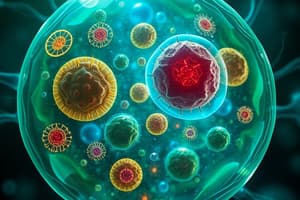Podcast
Questions and Answers
Which organelle is primarily responsible for protein synthesis?
Which organelle is primarily responsible for protein synthesis?
- Ribosomes (correct)
- Plastids
- Mitochondria
- Golgi bodies
What structure is present in plant cells but absent in animal cells?
What structure is present in plant cells but absent in animal cells?
- Vacuoles
- Cell wall (correct)
- Cell membrane
- Centrosome
Which type of plastid is responsible for photosynthesis?
Which type of plastid is responsible for photosynthesis?
- Chromoplasts
- Leucoplasts
- Golgi apparatus
- Chloroplasts (correct)
What is the main function of mitochondria in cells?
What is the main function of mitochondria in cells?
Which feature distinguishes prokaryotic cells from eukaryotic cells?
Which feature distinguishes prokaryotic cells from eukaryotic cells?
What is the primary role of the Golgi bodies in a cell?
What is the primary role of the Golgi bodies in a cell?
What occurs immediately after the nucleus divides during cell division?
What occurs immediately after the nucleus divides during cell division?
Which type of cell is characterized by a lack of a well-organized nucleus?
Which type of cell is characterized by a lack of a well-organized nucleus?
Flashcards
What are ribosomes?
What are ribosomes?
Small structures responsible for protein synthesis in cells.
What is the endoplasmic reticulum?
What is the endoplasmic reticulum?
A network of tubules and channels in cells that helps in synthesis, storage, and transport of cell products.
What are vacuoles?
What are vacuoles?
Sac-like structures in cells that store various substances like food, wastes, and cell secretions. Plant cells have a large central vacuole.
What are mitochondria?
What are mitochondria?
Signup and view all the flashcards
What are plastids?
What are plastids?
Signup and view all the flashcards
What is cell division?
What is cell division?
Signup and view all the flashcards
What are prokaryotic cells?
What are prokaryotic cells?
Signup and view all the flashcards
What are eukaryotic cells?
What are eukaryotic cells?
Signup and view all the flashcards
Study Notes
Cell Organelles
- Cell organelles are small structures within the cytoplasm
- Various organelles perform specific functions
- Ribosomes synthesize proteins
- Golgi bodies (Golgi apparatus) secrete chemicals
- Plastids are found only in plants, play roles in photosynthesis (chloroplasts), non-green pigments (chromoplasts), and storage (leucoplasts)
- Mitochondria are energy producers, via oxidation of food (respiration)
- Vacuoles store food, wastes, and secretions
- Endoplasmic reticulum transports cell products
Prokaryotic and Eukaryotic Cells
- Cells are classified into Prokaryotic and Eukaryotic
- Prokaryotic cells lack a well-organized nucleus
- Eukaryotic cells have a well-organized nucleus with a nuclear membrane
- Bacteria and blue-green algae are prokaryotic examples
- Plants, animals, fungi, and protozoa are eukaryotes
Comparison Between Plant and Animal Cells
- Plant cells are generally larger than animal cells
- Plant cells have a cell wall, animal cells do not
- Plant cells contain large vacuoles, animal cells contain small or no vacuoles
- Plant cells usually contain plastids, animal cells do not
- Plant cell centrosome (Golgi apparatus) is developed, and scattered throughout the cytoplasm; animal cell centrosome is near the nucleus
Studying That Suits You
Use AI to generate personalized quizzes and flashcards to suit your learning preferences.




